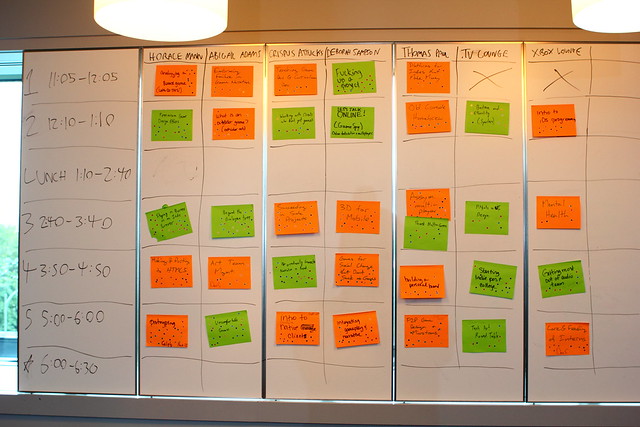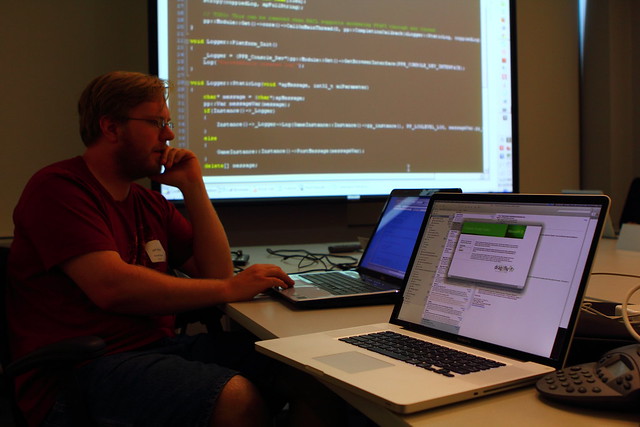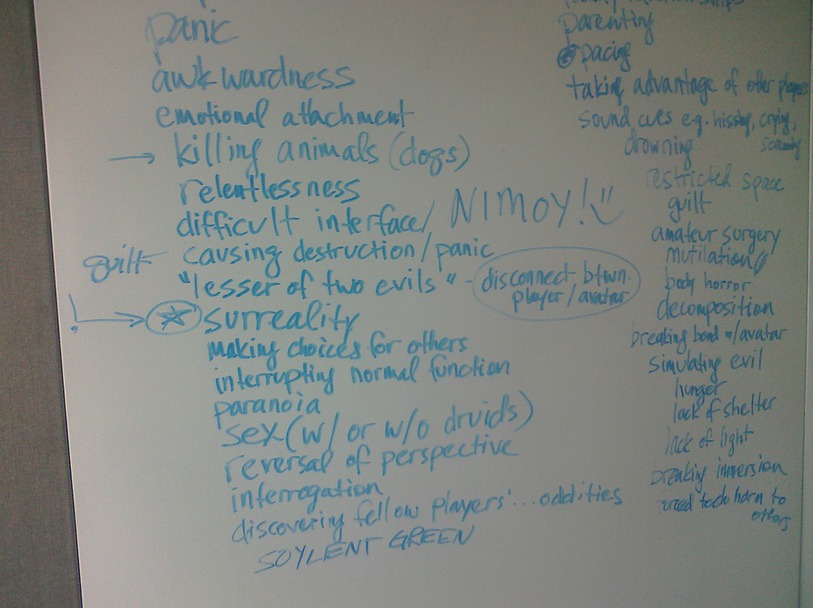Every year for the last four years I have co-run (with Scott Macmillan) an unconference in Boston called GameLoop. It’s a self-organizing conference where there’s no set agenda: everyone shows up and figures out what to talk during a one-hour organizational session at the start of the day. I could write a whole post about how we organized it, but for now I want to collect the notes from the sessions that I attended.
What is an outsider game?
This was the session I ran. There are a bunch of games that I really like, but don’t have a word for. Things like The war of the end of the days, which is an objectively bad Xbox Live Indie Game that is made by someone who is clearly learning how to make 3D games. Because this person doesn’t really understand things like texturing and shading, he accidentally causes the player to experience mind-bending vertigo at times, which is super-interesting to me and one of the reasons why I like the game so much.
I am tempted to call these things “outsider games” as in “outsider art,” but the phrase “outsider games” doesn’t really sit well with me for any number of reasons. I organized this session to help myself get a better handle on whether it’s a valid label or not. Some notes from our discussion:
- A lot of this hinges of awareness of convention, in terms of both design convention and technical convention. For example, Xbox Live Indie Games, although they are not reviewed by Microsoft, are reviewed by a community before being placed on the service. The community will not allow games that have console-crashing bugs. As a result, a game like The war of the end of the days is not buggy, per se. It just has an overall bad user experience — which is mostly design convention. When it eschews technical convention, you get things like the untextured single color flat polygon labyrinth that is incredibly confusing and interesting to navigate even though the labyrinth itself is only the size of a 20×20 room and could be completed in seconds were it textured and lit properly.
- Some asked whether there was a bias in the medium: in order to make a game that even runs you need some level of technical competency. Compare it to painting, where even a child can perform the basic mechanics of putting pigment on paper. The argument was something like, “Bad games are hard enough to make that game creators are by necessity not outsiders as they’ve had to do some research and be aware of conventions.” I don’t buy this at all: I’ve seen 10-year-olds create perfectly playable stuff in GameMaker. Also, technical competency does not mean it’s not outsider art: many outsider and folk artists show very high levels of technical competency.
- Can someone be “outsider” if they’re making money off their product? The answer to that was a firm “yes,” particularly if you’re looking at the model of outsider music.
- Clara Fernandez-Vara pointed us to this article by Joel Goodwin about the game programmer Bill Williams, who had a terminal diagnosis of cystic fibrosis, and whose disease informed every game he made until his death in 1998.
Mental health
This was the highlight of GameLoop for me. This was the highlight of any GameLoop I’ve ever put on, and indeed, probably the best conference session I’ve ever attended.
The session was hosted by Ray Merkler, who is one of the GameLoop Philly organizers. Ray (who gave me permission to talk about this) is diagnosed with bipolar disorder, and opened the session talking about his experiences with trying to be an employee, develop games, and manage his mental health.
It was a small group of people: about a dozen of us, maybe five of whom I’ve known for years. The discussion ended up touching on a few topics:
- People’s own experiences dealing with their mental health issues and the workplace.
- How workplaces (particularly the in game industry) can exacerbate mental health problems.
- Ways in which employers can help create a work environment where employees are able to manage their mental health.
We heard from people who can’t conform to a traditional 9-5 work schedule. For example, they can be extremely productive 2-3 days a week, but the other days they just can’t do anything. They get all their work done on time, but because they’re not always “looking productive,” they’re often targeted as bad workers.
One developer said that he absolutely needs physical exercise at 7pm every day or he’ll start to spiral down in terms of both his own health and his productivity. During crunch, while everyone is staying late to work, he gets up and leaves for 90 minutes and comes back to the office sweaty to keep working. Fortunately, he’s talked to his employer about this, and they understand that’s it’s just something he has to do. But I can imagine that it must have been difficult to have that conversation, and I know for a fact that there are employers out there who would not stand for such a thing.
My main reason for attending was to hear how employers can create better environments for employees. My big takeaways:
- Make sure the healthcare plan you offer has a mental health plan, and communicate that very clearly to new employees. Remind current employees periodically. Some healthcare plans can provide you with brochures that you can distribute to employees.
- Create an environment where employees spend time with each other. Something as simple as a culture where people eat together, rather than at their desks, can help employees forge relationships and provide each other mutual support. For one thing, as an employer you can’t say to an employee “Hey, we think you have mental health problems, you should get that checked out,” but a coworker and friend may be able to talk to them about it.
- Also, don’t stop at lunch. There can be other activities, and they should be diverse. Just because your company has beer on Fridays doesn’t mean that activity appeals to everyone. Mix it up. Try a picnic or a movie or a game night.
- If you can be flexible on work hours, that can be an enormous boon. For example, certain medications like antidepressants can screw with your sleep cycle. Being able to work a shifted schedule is a huge benefit. In a similar vein, you should consider allowing employees to work from home if possible.
What was most interesting about the session was that it ended up being about quality of life issues, but not in the tired “do we unionize or not?” sense. It was a far more personal QoL discussion, and I think as a result it was far more effective.
I also loved this session because it’s exactly the kind of thing that you would never, ever see at GDC.
Making and porting games to HTML5
This was a nice session in that most people in the room had already at least done a little bit of HTML5 work. As a result it ended up as a technically deeper discussion than the usual “what is HTML5 and how do I use it?” stuff. I don’t remember much, though I did talk through a lot of the performance metrics I’ve been taking on our WebGL port of Fieldrunners. I also introduced people to UglifyJS (web version here) as a really great JavaScript compressor and obfuscator.
Uncomfortable games
The last session I attended was organized by JP Grant. We began by going around the room and talking about uncomfortable moments in gaming. There were about 30 people in the room, so it took a while, but in the end things seemed to boil down to a few categories of discomfort. The most prevalent one was what JP called “body horror” — things from disturbing Giger-esque images to experiences like suffocating in your own gas mask in Metro 2033. There was also a lot of social discomfort: griefing someone and feeling good about it (and feeling awful about that), noticing that a friend playing GTA4 is maybe a bit more of a sociopath than you had expected, and “any interaction with a guild, ever.” I didn’t take great notes, but I know someone took a picture of the whiteboard. If it gets posted somewhere I’ll link it here.
Thanks to Dan Silvers, for the following image of the whiteboard:



{ 7 comments }
I took a few pictures of the Uncomfortable Games whiteboard. I’ll forward them along to you.
Thanks Dan, posted!
Darius, kudos to you and Scott on another awesome unconference! I was again impressed by how efficiently things ran and how engaging sessions were. I know I’m not alone in making GameLoop a must-attend event every year.
Regards the term “outsider games” – I tried to coin the developers of this sort of game amateurs in an article which received a certain level of notoriety in the indie space (http://www.gamesetwatch.com/2008/02/column_the_amateur_amateur_vs.php = not helped by Simon Carless retitling it Amateur vs Indie – The War?).
Outsider games is probably as good a label as we’re going to get and instantly understandable by pretty much everyone.
Interesting section on mental health. My son has Non-24-hour sleep-wake syndrome and lives with a 26 hour day. You can’t ever expect him to come in on a normal schedule. Google put up with it, as have the 2 game companies he’s worked for. He makes it a condition of his employment and explains it up front before he’s hired. Imagine having him on your dev team! But you’re right, a lot of places wouldn’t stand for it.
I wish I could have attended the Uncomfortable Games talk, but I had to leave just as the last session was starting for a friend’s wedding-related party. Out of curiosity, did The Path get brought up at all? I know that one made me uncomfortable for a variety of reasons.
I don’t think it was brought up, but I’m not 100% sure.
Comments on this entry are closed.
{ 2 trackbacks }